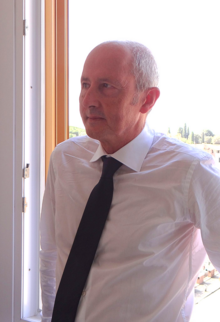Francesco Sciortino
Francesco Sciortino | |
|---|---|
 Francesco Sciortino in 2020 | |
| Born | December 1960 (age 63–64) |
| Nationality | Italian |
| Alma mater | University of Palermo (PhD) |
| Known for | Liquid–liquid critical point in water Glasses and gels Colloidal self-assembly |
| Scientific career | |
| Fields | Computational Physics Soft Matter Materials Science |
| Institutions | Sapienza University of Rome Centro di Ricerca, Sviluppo e Studi Superiori in Sardegna Boston University University of Palermo |
| Website | www |
Francesco Sciortino (born December 29, 1960) is an Italian physicist and full professor at Sapienza University of Rome. He has made seminal contributions to statistical physics, including the thermodynamic and dynamic theory of complex fluids like water, colloids, colloidal-polymer mixtures, patchy particles, and DNA-based materials. He is one of the original proponents of the "second liquid critical point" theory of water.
Education
[edit]This section of a biography of a living person does not include any references or sources. (February 2023) |
Sciortino was awarded a Ph.D. in physics from the University of Palermo in 1989 working on the coupling between biomolecules and the solvent, and focusing on the role of water's hydrogen bond cooperativity in supramolecular arrangement of biomolecules. After the Ph.D., Sciortino became research assistant in the Center for Polymer Studies of Boston University, working in the group of Prof. H. Eugene Stanley.
Academic career
[edit]Following his postdoctoral research position in Boston, in 1992 Sciortino became a researcher in Centro di Ricerca, Sviluppo e Studi Superiori in Sardegna, Cagliari. One year later he moved to Sapienza University of Rome, where he became assistant professor in 1993, associate professor in 2000, and full professor in 2005.[1] He serves as associate editor of the Journal of Chemical Physics.[2]
Research and achievements
[edit]Sciortino has made seminal contributions in the field of statistical mechanics and soft condensed matter theory. He is one of the original proponents of the Second Liquid Critical Point Hypothesis for water,.[3] which explains water's anomalous behaviour with the presence of a hidden critical point in supercooled water. Experimental verification of this hypothesis has been obtained numerically in several models of water,[4][3][5][6][7] and finally confirmed with scattering experiments using X-ray pulses.[8]
Sciortino has worked extensively on the physics of arrested states of matter, making seminal contribution to Mode Coupling theory[9] and the Potential Energy Landscape formalism.[10] He and his collaborators hypothesised a novel type of glass (re-entrant glass) in short-range attractive colloidal systems, and this prediction was later confirmed by several experiments and numerical simulations.[11] Sciortino and his co-authors were also the first to identify colloidal gels as the outcome of a dynamical arrested phase separation process.[12] His contributions to the physics of reduced valence interactions are numerous:[13] the discovery of empty liquids, equilibrium gels, re-entrant topological transitions in network fluids, among many others[14][15]
According to Scopus, Sciortino's work has been cited 27315 times, and his H-index is 93.[16] Google Scholar lists 38415 citations and an H-index of 105 .[17] Thanks to these bibliometric indexes, he is ranked among the top 10 Italian Physicists in activity.[18]
References
[edit]- ^ "Sciortino's public page on the Sapienza website (in Italian)". Retrieved 16 February 2023.
- ^ "The list of J. Chem. Phys. editors". Retrieved 16 February 2023.
- ^ a b Poole, Peter H.; Sciortino, Francesco; Essmann, Ulrich; Stanley, H. Eugene (1992). "Phase behaviour of metastable water". Nature. 360 (6402): 324–328. Bibcode:1992Natur.360..324P. doi:10.1038/360324a0. S2CID 4302774.
- ^ Debenedetti, Pablo G.; Sciortino, Francesco; Zerze, Gül H. (2020). "Second critical point in two realistic models of water". Science. 369 (6501): 289–292. Bibcode:2020Sci...369..289D. doi:10.1126/science.abb9796. PMID 32675369. S2CID 220548225.
- ^ "Ricerca: scoperte due forme diverse dell'acqua". Adnkronos. 12 December 2020. Retrieved 16 November 2022.
- ^ "Second critical point appears in two models of water". Physics World. 18 August 2020. Retrieved 16 November 2022.
- ^ "Scientists look inside water, end up solving 30-year-old mystery". India Today. Retrieved 16 November 2022.
- ^ Kim, Kyung Hwan; Amann-Winkel, Katrin; Giovambattista, Nicolas; Späh, Alexander; Perakis, Fivos; Pathak, Harshad; Parada, Marjorie; Yang, Cheolhee; Mariedahl, Daniel; Eklund, Tobias; Lane, Thomas J.; You, Seonju; Jeong, Sangmin; Weston, Matthew; Lee, Jae Hyuk; Eom, Intae; Kim, Minseok; Park, Jaeku; Chun, Sae Hwan; Poole, Peter H.; Nilsson, Anders (2020). "Experimental observation of the liquid-liquid transition in bulk supercooled water under pressure". Science. 370 (6519): 978–982. Bibcode:2020Sci...370..978K. doi:10.1126/science.abb9385. PMID 33214280. S2CID 227059917.
- ^ Kob, Walter; Nauroth, Markus; Sciortino, Francesco (2002). "Quantitative tests of mode-coupling theory for fragile and strong glass formers". Journal of Non-Crystalline Solids. 307 (1): 181. arXiv:cond-mat/0109285. Bibcode:2002JNCS..307..181K. doi:10.1016/S0022-3093(02)01457-6. S2CID 96387052.
- ^ Sciortino, Francesco (31 May 2005). "Potential energy landscape description of supercooled liquids and glasses". Journal of Statistical Mechanics: Theory and Experiment. 2005 (5): P05015. Bibcode:2005JSMTE..05..015S. doi:10.1088/1742-5468/2005/05/p05015. S2CID 55598590. Retrieved 10 April 2022.
- ^ Sciortino, Francesco (1 November 2002). "One liquid, two glasses". Nature Materials. 1 (3): 145–146. doi:10.1038/nmat752. PMID 12618795. S2CID 5051410. Retrieved 10 April 2022.
- ^ Lu, Peter J.; Zaccarelli, Emanuela; Ciulla, Fabio; Schofield, Andrew B.; Sciortino, Francesco; Weitz, David A. (2008). "Gelation of particles with short-range attraction". Nature. 453 (7194): 499–503. Bibcode:2008Natur.453..499L. doi:10.1038/nature06931. PMID 18497820. S2CID 4409873.
- ^ Russo, John; Leoni, Fabio; Martelli, Fausto; Sciortino, Francesco (11 January 2022). "The physics of empty liquids: from patchy particles to water". Reports on Progress in Physics. 85 (1): 016601. arXiv:2112.08318. Bibcode:2022RPPh...85a6601R. doi:10.1088/1361-6633/ac42d9. PMID 34905739. S2CID 245144320.
- ^ "Il gel "stabile" che risolve il rebus della maionese impazzita". sussidiario.net. 30 December 2010. Retrieved 16 November 2022.
- ^ "In arrivo dai laboratori i nuovi supermateriali". Corriere della Sera. 14 August 2013. Retrieved 16 November 2022.
- ^ "Francesco Sciortino". Scopus. Retrieved 4 April 2022.
- ^ "Francesco Sciortino". Google Scholar. Retrieved 4 April 2022.
- ^ "Top Italian Scientists Physics".
